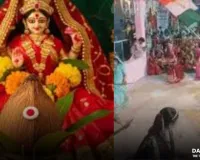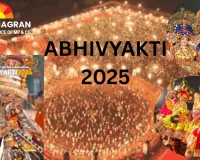MP OBC Quota Affidavit Controversy: Government Denies Anti-Hindu Content Allegations
Digital Desk

Madhya Pradesh faces political storm over viral social media claims about Supreme Court affidavit supporting 27% OBC reservation.
The Madhya Pradesh government under Chief Minister Dr. Mohan Yadav has become embroiled in a significant political controversy just days before the Supreme Court's scheduled daily hearings on OBC reservation beginning October 8. The controversy erupted after excerpts from historical commission reports went viral on social media, with critics alleging the government endorsed anti-Hindu content in its Supreme Court affidavit.
The Viral Content That Sparked Outrage
The documents circulating on social media contained references to two major mythological episodes that critics claimed insulted Hindu traditions. The controversial passages cited the killing of sage Shambuka by Lord Ram for violating caste norms despite performing penance, stating that "a person of lower caste performing noble work, gaining respect, and doing meditation was considered against the rules". Additionally, the content referenced Dronacharya's refusal to teach archery to Ekalavya due to his Bhil identity, highlighting historical caste-based discrimination.
These excerpts led to widespread accusations that the BJP government had portrayed Hindu scriptures and deities in an insulting manner to support OBC reservation arguments. Social media users accused the administration of legitimizing narratives that vilified Hindu culture, creating significant backlash from the party's own support base.
Government's Official Clarification
Facing mounting criticism, the Madhya Pradesh government issued a comprehensive clarification on October 1, firmly denying that the viral content formed part of their Supreme Court affidavit. The state's Public Relations Department emphasized that these excerpts originated from the 1983 Ramji Mahajan Commission Report, submitted during a Congress government, not from the current BJP administration's official position.
BJP's state media in-charge Ashish Agarwal described the controversy as "propaganda by mischievous elements," clarifying that the circulated document was from the Madhya Pradesh State Backward Classes Commission report from 1983, not from the current administration. The government stressed that its 80-page official affidavit contained no such references, with the controversial content appearing only in the 14,920 pages of annexures comprising historical commission reports.
The Legal Battle Context
The Supreme Court will conduct daily hearings from October 8 on Madhya Pradesh's decision to increase OBC reservation from 14% to 27%. This increase would push the state's total reservation to 63% (16% SC + 20% ST + 27% OBC), exceeding the Supreme Court's established 50% ceiling set in the 1992 Indira Sawhney case.
The government has submitted a comprehensive 15,000-page report to justify breaching the 50% limit by citing "extraordinary circumstances" and demonstrating OBCs' under-representation despite constituting nearly 48% of the state's population. The case originated when the Kamal Nath government increased OBC reservation in 2019, which was subsequently challenged in Jabalpur High Court and later transferred to the Supreme Court in 2024.
Historical Commission Reports Under Scrutiny
The controversy centers around four major reports attached as evidence to support the government's case. The Ramji Mahajan Commission, formed in 1983 under Arjun Singh's Congress government, had originally recommended 35% OBC reservation. The current BJP government implemented only 27%, demonstrating they did not adopt the commission's recommendations wholesale.
Additional supporting documents include State Backward Classes Commission reports from 1994-2011, a 2023 survey by Dr. BR Ambedkar Social Science University documenting continued OBC marginalization, and the Gaurishankar Bisen Commission Report on backward class welfare. These historical documents form part of the judicial record transferred from the High Court to substantiate claims of persistent OBC under-representation.
Political and Social Implications
The controversy has created internal tensions within the BJP, with party supporters demanding withdrawal of the affidavit and expressing concern about perceived anti-Hindu content. Opposition parties, including Congress, have seized on the issue to criticize the government's handling of sensitive religious and caste matters.
The incident highlights the delicate balance required when addressing reservation policies in a state where caste and religious sensitivities intersect with social justice demands. With the Supreme Court hearings imminent and recruitment processes for thousands of government positions hanging in the balance, the resolution of this controversy will significantly impact both legal proceedings and political dynamics in Madhya Pradesh.
The government has announced investigations into the spread of "misleading content" on social media while reaffirming its commitment to social harmony under the principle of "Sabka Saath, Sabka Vikas".







1.jpg)



